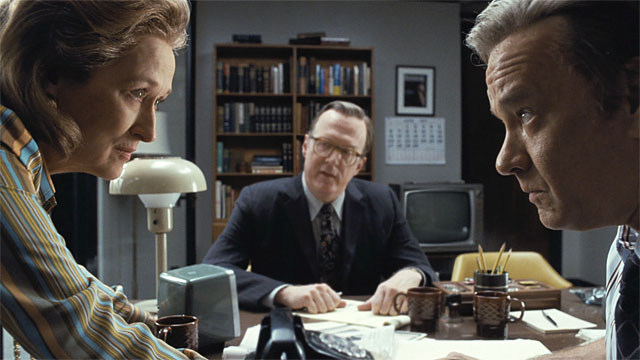From the Desk of the President: A Review of “The Post”

Caption: The Post - starring Tom Hanks and Meryl Streep. No courtesy

By University President John Garvey
Jeanne and I recently went to see The Post, a movie about the Washington Post’s race to publish the Pentagon Papers. Steven Spielberg directed it. The acting was pretty good. Meryl Streep played Katharine Graham, the Post’s CEO. Tom Hanks was the executive editor, Ben Bradlee. One of my good friends from law school became the publisher and CEO of the Post several decades later, so we had a kind of personal interest in the story.
From the previews, I had expected a movie about the Watergate scandal, but it was actually about an earlier legal controversy – a leak of classified documents (“the Pentagon Papers”) from the Vietnam War. The dramatic arc spans Katharine Graham’s development from heartbroken widow to the first female Fortune 500 CEO.
Graham took over the paper after her husband’s suicide in 1963. She begins the film as a stammering, overworked woman in grief, and develops into a leader willing to risk her company, her reputation, and her freedom (there were possible criminal charges) for the story of a lifetime. Her decision transformed the Post from a local newspaper into a national player.
The New York Times (as that paper modestly mentions in its review of the film) actually broke the Pentagon Papers story first. When the Nixon Administration got an injunction against further publication by the Times, the Post had to decide whether to continue the job.
The story is told in a way that is sympathetic to the press, but it’s not entirely clear that they are in the right. The Pentagon Papers contained evidence that the government lied to the public about the prospects for success in the Vietnam War. In a democracy where the people are sovereign, that is information we need to know.
On the other hand, there is a significant breach of ethics involved in publishing classified documents. We have a classification system in order to prevent disclosure of information that could be harmful to national security. Imagine, one judge asks when the case goes to court, if the Post had undertaken to publish the date and landing plans for D-Day. One can argue that if the Times or the Post wanted the scoop, they should have done their own research. They could have sent reporters and conducted their own interviews instead of relying on the theft of classified documents.
The Supreme Court ultimately ruled, 6-3, that the injunction against the Times violated the first amendment because a prohibition in advance of publication (a “prior restraint”) requires a particularly weighty justification. It left open the question whether the newspapers could be punished after the fact.
The role of the press in a democracy like ours is a matter of real contemporary interest. President Trump’s war with the press aims the movie’s central thesis (“the only way to protect the right to publish is to publish”) directly at the modern viewer.
John Garvey







Also, of note, one of the stars of the film, was Richard Nixon, as they used Nixon’s infamous tapes.
And, as the Post’s attorney so cogently argues, the Pentagon Papers were about past history, not the future of the European invasion by the allies.
In the midst of a never-ending 17-year long war and daily Tweet attacks against the free press that is so essential to our democracy, I found this to be a particularly timely film.